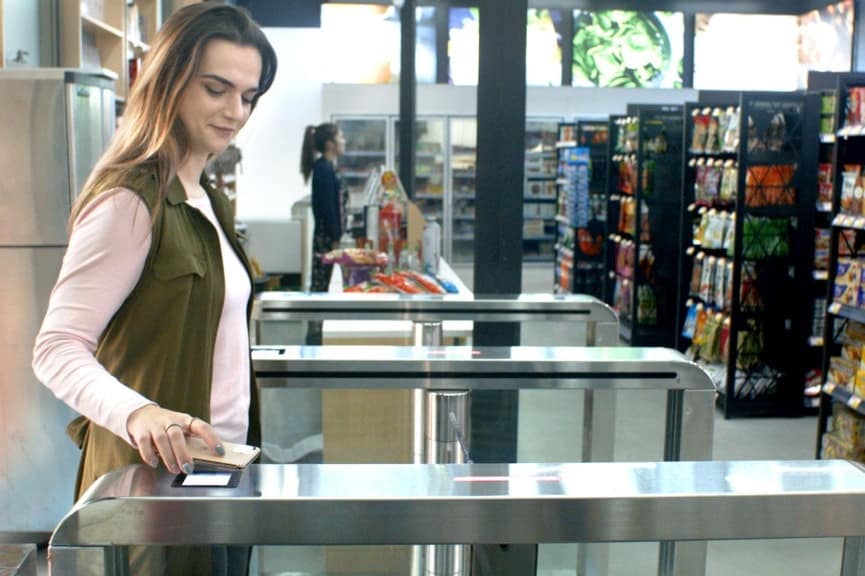Morrisons is trialling a till-free store in its Bradford headquarters, where shoppers can stock up on grocery essentials without needing to queue or pay at a checkout.
Shoppers use a dedicated app to enter the store, where they can pick up items from juices to evening meal ingredients, and then leave. What they buy is monitored through a camera-based, machine-learning solution from AiFi, before the receipt is sent to the shopper. AiFi technologies enable shoppers to pay using their preferred payment card.
The trial at Morrisons, a Leading retailer in RXUK Top500 research, uses a mobile pod that can be moved between sites and the supermarket has plans to launch several more sites within the next six months to test how it works and how customers respond. In its first week it seems the trial has been well-received and well-used.
Technology from California-based AiFi, found in 2016 by Steve Gu and Ting Zheng, is already used in autonomous grocery stores in locations from the US and China to Europe. Stores using its technology have recently launched in Poland, through convenience store operator Zabka, Hungary (Kende Gastro) and Amsterdam (Wundermart). The AiFi Oasis platform uses machine learning and computer vision to enable stores. AiFi was founded in 2016 by Steve Gu and Ying Zheng.
In context
Morrisons is the latest UK retailer to experiment with autonomous store technology in the UK. Sainsbury’s trialled a till-free store in 2019 but found that not all of its customers were ready to do away with the cash desk altogether. Last year, Tesco trialled a cashless store in locations including its own head office, and last month said it would open its first cashless store to the public. This March, Amazon opened the first Amazon Fresh stores in London, using ‘just walk out’ technology that it pioneered in its US home market. Morrisons, which supplies groceries to those stores, may judge that following a pandemic year in which contactless shopping has become normalised, customers will now be more welcoming of the idea.
Industry reaction
Commenting, Melissa Minkow, retail industry lead at CI&T, says: “The till-less model seems to fit most comfortably into categories where customers rarely need advice, like grocery shopping and personal care, so it is no surprise that supermarkets are becoming early adopters.
“For consumers, till-less indulges mission-based shopping – you can get in and out swiftly and avoid the browsing and queuing if you stick to your shopping list. At the same time, you are getting out of the house. It’s experiential, bridging the gap between social activity and digital convenience. When done correctly, till-less retail actually contributes to a richer shopping experience. This is because the model begins and ends with customer data. Whole new fields of customer insight and analytics can be opened up. It’s no longer a matter of just knowing what a customer has bought, but also how long they spent in the store and browsing what aisles.”
Sachin Jangam, partner for retail at Infosys Consulting, says:“Just walk out stores are a natural progression of the changes we’ve already seen in retail. Stores have moved from all staffed tills to self-checkouts, and more recently, scan on the go. Considering the stages of this evolution so far, it’s clear that ‘just walk out’ will be the future. With Morrisons now testing out the concept, following Tesco’s first-ever cashless store earlier this year, it seems the transition to ‘just walk out’ models is being led by the Big 4. This is not surprising, given their ability to make significant technology investments, and sheer store format size and overall product density on the shelves. However, this model is far more suited to the high street stores owned by the Big 4, rather than their large superstores.
“For now, the main clientele continues to be curious shoppers and tourists. The overall economics of store operations are still in question, given the reduced product range, high rental costs, and significant technology investments required. ‘Just walk out’ will likely remain in a trial period for the next few years, before we start to see mass rollouts. Beyond technology, leaders will be paying close attention to store profitability before putting money behind this innovation.”
Retail technology company Ubamarket says its own research now shows that 43% of UK shoppers want their shopping experience to involve as little human interaction as possible, with 62% saying they want to be able to complete a supermarket shop and leave in as little as 20 minutes. Its Scan, Pay, Go app is being adopted by retailers including the Central England Co-op, Spar, Budgens and Londis.
Ubamarket chief executive Will Broome says: “The research clearly shows that the Coronavirus pandemic has completely transformed both retailer and consumer behaviour – in particular when it comes to purchasing their goods. The pandemic has raised huge questions around hygiene and safety, with particular concerns around consumer confidence. This fluctuation in shopping habits has further highlighted a number of pre-existing problems with the shopping experience in Britain, with a huge proportion of Brits now feeling that their shopping experience is outdated. Now, the question facing businesses is not ‘when will things go back to normal’ but rather ‘how can we adapt to succeed and serve customers in a post-Covid world?’”









